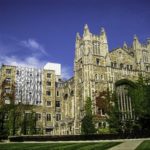30 Medical Internships + Programs for High Schoolers in 2025
What’s Covered:
- 15 Medical Programs for High School Students
- 15 Medical Internships for High School Students
- How Do Internships Impact Your College Chances?
Considering a career in medicine? Internships and medical pre-college programs can give you a head start on your career and even help you get into college. These opportunities can provide you with experiences such as working in a lab and conducting trials, all while providing first-hand experience in settings like universities, hospitals, clinics, and research facilities.
15 Medical Programs for High School Students
1. Stanford Medical Youth Science Program (SMYSP)
Application Deadline: March 17
Duration: Five weeks (June 23 – July 25)
In this five-week, tuition-free immersive program, low-income, first-generation high school juniors who live in Northern California complete intensive coursework in medicine and health science, take part in professional development workshops, network with health professionals, and receive college admissions guidance and mentoring. Students will also complete a college-level research project on public health disparities and gain insight into navigating a career in medicine.
Just 24 students are chosen to participate in this selective summer program.
2. Rady Children’s Hospital-San Diego: Summer Medical Academy
Application Deadline: February 21
Duration: Two weeks (Session 1: June 16 – 278 or Session 2: July 7 – 18)
Offered through Rady’s Children Hospital San Diego, the Summer Medical Academy gives high school students interested in pursuing healthcare careers the opportunity to explore medical training and practice. High school students who have both completed 9th grade and are between 15-19 years old can gain hands-on experience, learn about key topics in medicine from experts, and network with future potential colleagues.
Prospective participants are admitted based on their interest in a health career, participation in extracurricular activities, and scholastic achievement. Special consideration will be given to students who reside near San Diego, seniors in high school or recent graduates, and those who have an affiliation with Rady Children’s Hospital-San Diego.
3. Lumiere Research Scholar Program
Application Deadline: Varies by cohort. Main summer deadlines are March 15, April 15, and May 15
Duration: Options range from 12 weeks to 1 year
Founded by Harvard & Oxford researchers, the Lumiere Research Scholar Program is a rigorous research program tailored for high school students. The program pairs high-school students with PhD mentors to work 1-on-1 on an independent research project. At the end of the 12-week program, you’ll have written an independent research paper! You can choose research topics from subjects such as medicine, computer science, psychology, physics, economics, data science, business, engineering, biology, and international relations.
This program is designed to accommodate your schedule—you can participate in the summer, fall, winter, or spring, and the program is also conducted fully remotely. While you must be currently enrolled in high school and demonstrate high academic achievement (most students have an unweighted GPA of 3.3), no previous knowledge of your field of interest is required. The cost of the program ranges from $2,800 to $8,900, but financial aid is available.
Note that this is a selective program. Last year, over 4000 students applied for 500 spots in the program. You can find more details about the application here.
4. UCSF Summer Student Research Program
Application Deadline: February 14
Duration: Nine weeks (June 2 – August 1)
Students in this program are placed in local clinics and science labs to participate in biomedical research projects. Through the program, participants receive one-on-one mentorship from healthcare providers and researchers. Participants also gain access to unique workshops, seminars, trainings, simulations, and networking events. The program is open to high school juniors and seniors, as well as current college undergraduates, from backgrounds underrepresented in the sciences, such as minority racial/ethnic groups, those with disabilities, and first-generation college students.
Program participants are eligible for a stipend ranging from $3,000 to $4,300.
5. Center for Disease Control (CDC) Museum Disease Detective Camp
Application Deadline: N/A
Duration: Five days (Session 1: June 23 – 27 or Session 2: July 21 – 27)
At the CDC headquarters in Atlanta, Georgia, rising high school juniors and seniors (who must also be 16 years old) have the opportunity to spend five days learning about public health. The topics covered vary and may include research, data collection, data analysis, and health education. Although the camp doesn’t focus on medical treatment, it’s a good opportunity for students interested in medicine to get a more comprehensive understanding of career paths in the field.
Activities are also diverse and include recreated outbreaks, mock press conferences, environmental and global health activities, a laboratory session, an introduction to chronic disease surveillance, and short lectures from world-renowned CDC scientists.
The program is free to attend. However, participants must provide their own housing and transportation to and from the CDC’s campus in Atlanta, Georgia. The program is highly selective—only 27 students are chosen from hundreds of applicants for each session.
6. Indiana University Simon Cancer Center Future Scientist Program
Application Deadline: N/A
Duration: Eight weeks (typically from early June to late July)
Participants in this eight-week program are paired with research mentors and work on projects at the University of Indiana School of Medicine’s downtown Indianapolis campus. They also participate in weekly workshops on topics concerning gaining admission to graduate and professional programs of study, along with professional development sessions.
This program is open to high school juniors enrolled in a Marion County public high school. Students must have a minimum 3.0 cumulative GPA, demonstrate an interest in science, and have a positive school attendance record. Participants also receive a stipend.
7. Penn Summer Academies
Application Deadline: N/A
Duration: Three weeks (July 5 – 26)
The University of Pennsylvania’s Summer Academies offer high school students the opportunity to engage in three-week-long, subject-intensive programs that combine advanced scientific or social theory with relevant applications. Each of the Penn Summer Academies are focused on a particular subject: you’ll choose between biomedical research, chemistry research, microbiology and infectious diseases, and neuroscience.
The program is open to high school students currently in 9th through 11th grade. Both residential and online opportunities are available. The program costs $9,949, although financial assistance is available for select Philadelphia students.
8. Health Care Career Exploration Camp
Application Deadline: N/A
Duration: Two days (Session 1: July 5 – 6 and Session 2: June 11 – 2)
This free program for Nebraska students in grades 10 through 12 allows participants to learn about a variety of healthcare careers, not just clinical positions. The program is offered at two CHI Health locations in Nebraska. Note that space is limited by location, and past participants are waitlisted to allow new students to attend.
9. Medical Immersion Summer Academy (MISA)
Application Deadline: N/A
Duration: Five days (Session 1: June 2 – 6, Session 2: June 9 – 13, Session 3: July 21 – 25, and Session 4: July 28 – August 1)
During MISA, you’ll learn about healthcare through hands-on clinical training in crucial skills (like suturing, providing CPR, splinting, and taking vitals) and mentorship opportunities. The purpose of the program – which was started in 2012 and takes place in Oakland, CA – is to give students interested in healthcare careers a strong knowledge foundation early on.
The program is open to all high school students in grades 9 through 12, so long as you are 15 by the start of the program. It costs $1,800 to attend MISA, plus a $75 non-refundable application fee.
10. Nova Southeastern University’s College of Osteopathic Medicine: Achieve in Medicine (AIM–High)
Application Deadline: May 1
Duration: Five days (Session 1: June 23 – 27, Session 2: July 7 – 11, and Session 3: July 14 – 18)
This program offers high school students the unique opportunity to fully immerse themselves in the field of medicine. Through AIM-High, students will gain hands-on medical experiences, such as using technology in the diagnosis and treatment of medical conditions, alongside NSU medical students and staff. Activities include both educational interactive sessions and social events.
The program offers three sessions—two sessions at NSU’s main campus in Fort Lauderdale and one session at its Clearwater campus—and is available to high school students of all ages, so long as they have a GPA of at least 3.2. Tuition for AIM-High is $1,600, plus a $50 non-refundable application fee, and students will leave the program certified in first aid and CPR.
11. National Student Leadership Conference on Medicine & Healthcare
Application Deadline: Rolling
Duration: Nine days
This summer program gives high schoolers a chance to learn about controversial medical issues, today’s healthcare challenges, and advanced scientific research in areas such as cancer and HIV/AIDS. The program is offered at:
- American University
- Duke University
- University of British Columbia
- UC Berkeley
- University of Miami
- University of Michigan
- Yale University
Students will perform clinical rounds, learn medical examination and surgical techniques, and contribute to a public health project focused on developing a media campaign to spread information on illness and disease prevention. Participants will also be able to take an online college credit course taught by American University faculty after completing the program.
The cost of the program varies from $4,095 to $4,395, depending on location.
12. Eve and Gene Black Summer Medical Career Program
Application Deadline: February 14
Duration: Varies by facility
For more than 50 years, this free medical mentorship program has encouraged students to follow career paths all across medicine. Participants attend daily interactive sessions presented by a range of medical professionals, including surgeons, nurses, pharmacists, dieticians, ophthalmologists, radiologists, and therapists. There are also two online sessions offered in July.
The program is open to high school juniors and seniors (at the time of application) living in Los Angeles and its adjacent counties. Some facilities may have additional age requirements. Note that if you have participated before, you cannot reapply.
13. Georgetown Medical Academy
Application Deadline: April 15
Duration: One week (Session 1: June 8 – 14, Session 2: June 22 – 28, and Session 3: July 6 – 12)
Students in this summer program will learn about medicine and get an up-close-and-personal look at the Georgetown University Medical Center, including its world-renowned Lombardi Cancer Center. Participants explore a variety of topics, including human anatomy, physiology, radiology, surgery, cancer, and biomedical ethics. They’ll also gain hands-on experience in suturing, casting, and dissection. Ultimately, it gives a glimpse into the path to becoming a physician.
The residential program costs $3,905 and $3,025 for commuters.
14. Health Care Careers Exploration Program
Application Deadline: April 30
Duration: One week (July 26 – 31)
This week-long summer program at Rochester Institute of Technology provides deaf and hard-of-hearing students in grades 10 through 12 the opportunity to deepen their knowledge of important issues in healthcare and prepare for a potential career in the field. Students will attend medical demonstrations, participate in hands-on activities and demonstrations, and become CPR and first aid certified. Students will also engage in a variety of social activities, such as swimming, bowling, going to the movies, and visiting local places of interest.
The cost of the program is $850.
15. Wake Forest Summer Immersion Medicine Institute
Application Deadline: N/A
Duration: One week (Session 1: July 6 – 11 and Session 2: July 20 – 25)
Students in grades nine through twelve can gain hands-on medical experience and explore healthcare careers in this week-long summer program. They will explore fields such as internal medicine, cardiology, pulmonology, cancer care, and surgery, while building real-world skills like taking blood pressure, interviewing patients, and conducting ultrasounds.
Participants will visit Atrium Health Wake Forest Baptist Medical Center and tour the Wake Forest School of Medicine. They will also meet and interact with current medical students. The cost of the program is $3,400.
15 Medical Internships for High School Students
16. High School Senior Summer Internship Program at Cincinnati Children’s Hospital
Application Deadline: February 1
Duration: Eight weeks
You can work with a mentor in one of the various pediatric clinical specialties in this eight-week program for Cincinnati-area graduating seniors. Participants also engage in group activities, including an afternoon hands-on training session with computerized simulated pediatric patients in the SIM Center, lunch seminars, networking sessions, and community service opportunities. Your internship will culminate in a graduation party featuring student presentations on their experiences.
Interns work 20 hours a week and are paid $13 an hour.
17. Magee-Womens Research Institute High School Summer Internship Program
Application Deadline: February 7
Duration: Six weeks (beginning June 16)
This is a six-week, 240-hour internship for high school sophomores and juniors (who will be over 16 when the internship starts) where participants conduct scientific research under the supervision of an investigator and their staff at MWRI and Magee-Womens Hospital. Interns also participate in sessions where investigators discuss careers in biomedical science and their journeys and perspectives. At the program’s conclusion, interns will present their findings to other participants as well as to the MWRI faculty and staff.
This is a free and extremely competitive program, which has been around since 1995—less than 8% of the students who apply are chosen. Note that to apply, you must permanently reside in southwest Pennsylvania. Students from families that qualify for the National School Breakfast and Lunch Program for Pennsylvania are eligible to receive a $1,800 stipend for their participation in the program.
18. Max Planck Florida Institute for Neuroscience High School Internship
Application Deadline: March 4
Duration: Six weeks (June 16 – July 56)
This six-week internship is for rising juniors and seniors (who will be at least 16 when the internship starts) from Palm Beach or Martin County high schools who are interested in brain structure, function and development, and the advanced imaging techniques and technologies used in neuroscience. Neuroscience interns participate in one of three tracks: neuroscience, scientific programming, or mechanical engineering. At the end of the internship, students will write a scientific abstract and deliver a short presentation.
Interns can expect to work 40 hours per week during the internship and are compensated at a rate of $13 per hour.
19. KP Launch
Application Deadline: N/A
Duration: Seven weeks (June 16 – August 1)
Kaiser Permanente offers the KP Launch program to students aged 16 to 19. This seven-week internship program takes place at medical offices throughout Northern California and offers opportunities in departments including nursing, internal medicine, administration, and patient care services. During the program students develop personal and professional skills, receive mentorship, and gain firsthand experience in healthcare careers.
Priority is given to high school seniors and juniors. Participants earn $24 per hour
20. Summer Child Health Research Internship
Application Deadline: N/A
Duration: Nine weeks (June 2 – August 1)
This medical internship is open to rising high school seniors, as long as they will be over 18 when the internship starts, who will complete their work alongside undergraduates and first-year medical students. Through the internship, students will explore research opportunities related to child healthcare while working in a lab with faculty members of the Department of Pediatrics at Children’s Hospital Colorado and the University of Colorado on the Anschutz Medical Campus. At the conclusion of the program, students are required to submit an oral or poster summary of their research.
High school participants must be Colorado residents and are provided with a $4,400 stipend.
21. Fred Hutch Summer High School Internship Program (SHIP)
Application Deadline: March 31
Duration: Eight weeks (June 23 – August 15)
This eight-week, full-time, paid internship is for students entering their senior year, specifically those from backgrounds underrepresented in biomedical science. The first two weeks of the program are focused on training participants in laboratory safety skills and techniques. For the following six weeks, participants are immersed in mentoring activities. Interns will also take part in research seminars, professional development workshops, and social activities, and give a presentation to the Fred Hutch community at the end of their internship.
Interns are provided a stipend for completing the program, and those commuting from the greater Seattle area are also given a free ORCA card for the local buses.
22. Harvard Medical School Project Success for High School Students
Application Deadline: February 3
Duration: Seven weeks (June 30 – August 15)
Project Success is aimed at students from disadvantaged backgrounds and groups underrepresented in medicine. The program provides paid summer research positions at Harvard Medical School and its affiliated institutions to rising juniors and seniors from Boston and Cambridge (do note there are GPA and coursework prerequisites, and you must be 16 by the start of the program). In addition to performing mentored research, students will also participate in seminars, workshops, site visits, and career counseling.
23. Medical College of Wisconsin Apprenticeship in Medicine (AIM)
Application Deadline: March 1
Duration: Six weeks (mid-June 24 – early August)
AIM is a highly competitive program that provides internship opportunities to Milwaukee-area students. The program aims to stimulate interest in careers in medicine, biomedical research, and allied health. Interns will receive mentoring from current medical students and participate in clinical shadowing and simulations. They will also explore career paths and take part in social activities.
The program is free, and a stipend is awarded to students at its conclusion.
24. Pediatrics Internship Program at Stanford (PIPS)
Application Deadline: February 24
Duration: Six weeks (June 16 – July 25)
Rising high school juniors and seniors living in Northern California can learn about science, medicine, and research during this six-week internship. Participants will learn how research is performed and conduct their own research projects while working with Stanford faculty, postdoctoral fellows, researchers, and students. Anticipate working 30 hours per week during this program.
This is a free program, and students with financial need can receive a $3,000 stipend for participating
25. Inspiring New Scientists through Professional Internships and Research Experience (INSPIRE)
Application Deadline: February 8
Duration: Six — ten weeks (begins June 30)
The INSPIRE summer program at Cedars-Sinai introduces students to research in a healthcare setting. Participants are exposed to numerous technologies, techniques, and disciplines, including research fundamentals, data collection and analysis, safety regulations, and methods for writing a scientific abstract. In addition to research, interns will attend workshops focused on skill-building, career exploration, and networking.
26. High School Emerging Researcher Experience
Application Deadline: January 31
Duration: Eight weeks (June 9 – August 1)
This internship opportunity introduces current high school juniors and seniors to translational research. Participants will work side by side with undergraduate interns on research projects under the supervision of Houston Methodist faculty—learning lab techniques and gaining first-hand research experience.
The program also includes a curriculum focused on professional development and helps students build the tools needed to complete their college applications. Outside of the lab, there are a number of events open to interns—ranging from sporting events to lectures.
27. Summer Academic Research Experience (SARE)
Application Deadline: February 1
Duration: Eight weeks (June 23 – August 14)
Students selected for the Summer Academic Research Experience (SARE) Program are provided with a summer internship at the Johns Hopkins School of Medicine. Participants are introduced to real-world research, practice lab techniques, and receive training to strengthen essential skills such as critical thinking while taking courses in scientific writing, data analysis, mathematics, and bioethics.
The program is open to students from low-income or educationally under-resourced backgrounds. Interns receive a $3,000 stipend for their participation in the program.
28. Health Careers Motivation Program
Application Deadline: February 21
Duration: One week (June 16 – 27)
While not an internship per se, this free program from the University of Miami Miller School of Medicine provides high school students with the opportunity to explore careers in healthcare and learn what it takes to become a well-rounded medical school applicant. Participants are introduced to clinical medicine topics such as surgery, simulation, and patient case studies. They also receive mentorship from faculty and current students.
29. Cleveland Clinic Center for Youth and College Education (CYCE) Internships
Application Deadline: February 7
Duration: Seven weeks (June 9 – July 25)
The Cleveland Clinic hosts three unique, paid internships for high schoolers covering clinical, non-clinical, and advanced technology fields. The program is open to students in grades nine through 12 who have a minimum 2.5 GPA and an interest in a healthcare career.
Some internships have specific residency requirements.
30. Ladder Internship Program
Application Deadline: Varying deadlines based on cohort. Main summer deadlines are March 15, April 15, and May 15
Duration: Eight weeks
Ladder Internships is a selective start-up internship program for ambitious high school students! In the program, you work with a high-growth start-up on an internship. Start-ups that offer internships range across a variety of industries from tech/deep tech and AI/ML to health tech, marketing, journalism, consulting, and more.
Ladder’s start-ups are high-growth companies on average raising over a million dollars. Past founders have included YCombinator alumni, founders raising over 30 million dollars, or founders who previously worked at Microsoft, Google, and Facebook. In the program, students work closely with their managers and a Ladder Coach on real-world projects and present their work to the company.
This highly flexible program is designed to be accessible to a wide range of students. You will complete your internship remotely, from anywhere in the world, and there are internships available throughout the year, so you can easily plan around your other commitments—you can expect to work for 10-20 hours/week, for 8-12 weeks. Open to high school students and gap year students!
Here is the application form.
How Do Internships Impact Your College Chances?
Extracurriculars are extremely important in the admissions process, especially at selective schools. These schools get more academically qualified applicants than they can admit, so your extracurriculars (and essays) will help you stand out.
Extracurricular activities are divided into four tiers, with tier 1 representing the most exceptional and rare extracurriculars and tier 4 representing the most common activities admissions committees see. The higher the tier of an extracurricular activity is, the more impactful it is on admissions odds.
If you’re applying to highly selective schools, we recommend having at least a few tier 1 and 2 activities to set yourself apart from other applicants. Internships vary in terms of rigor and selectivity, but prestigious, national programs in particular can certainly fall into tiers 1 or 2.
Wondering how your internship impacts your chances? CollegeVine’s free admissions calculator can let you know! This tool uses factors like grades and test scores—along with other variables, like internships—to calculate your odds at hundreds of colleges. It can also provide valuable insight into areas where you can improve your profile.
Disclaimer: This post includes content sponsored by Lumiere Education.



